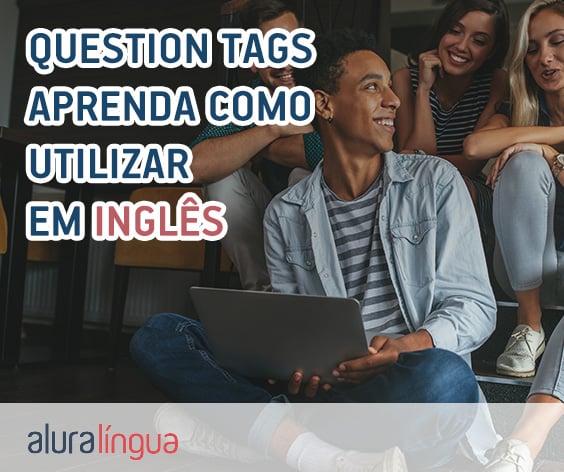
What's up? I bet you like reading our articles, don’t you? That’s why we always bring the best topics for you to improve your English skills and communicate in a better way. (E aí? Eu aposto que você gosta de ler nossos artigos, não gosta? Por isso nós sempre trazemos os melhores tópicos para você melhorar seu inglês e se comunicar de forma melhor.)
No artigo de hoje, a Alura traz para você as 'QUESTION TAGS'. Você já ouviu falar em question tags? Quando elas são usadas e como utilizar corretamente em uma question? Well, sabe quando você quer ver se aquela informação que você tem está correta? Nestas situações nós usamos a famosa QUESTION TAG.
Uma coisa muito interessante sobre essas tags é que ao construirmos a primeira parte da oração afirmativa, utilizaremos a tag na forma negativa; e se a informação for negativa, faremos a QUESTION TAG positiva. Do you feel me? Shall we see some examples?
GRAMMAR STRUCTURE - Estrutura gramatical
As we could see, as tag questions são construídas em duas orações. A primeira frase é composta da seguinte forma:
Subject + Auxiliary + Main verb + Complement (Sujeito + Auxiliar + Verbo principal + Complemento)
- You don't live here.
In our second phrase, known as question tag, we have another format. (Em nossa segunda frase, conhecida como question tag, temos outro formato.)
Auxiliary + subject
Auxiliar da oração principal + Sujeito da oração principal
- Do you?
É importante atentar-se à alguns fatos quando for construir uma question tag:
- Auxiliaries;
To be / to do / to have / will / could / would / should / can e modal verbs;
Dentro da tag question, uma oração sempre será positiva e a outra negativa, não importa a ordem.
Não utiliza-se nome próprio na question tag (2º oração)
You can speak Portuguese and English, can't you? - Você sabe falar português e inglês, não é?
They can't travel now, can they? - Eles não podem viajar agora, podem?
It's nine o'clock, isn't it? - São nove horas, não é?
Rachel didn't invite her, did she? - Rachel não a convidou, convidou?
You wouldn't do that to me, would you? - Você não faria isso comigo, faria?
Alessandra couldn't touch her toes last year, could she? - Alessandra não conseguia tocar os dedos dos pés no ano passado, podia?
You didn't call me, did you? - Você não me ligou, não é?
You were at the party, werent you? - Você estava na festa, não estava?
If you find it difficult to use the correct form in the question tag, the tip not to make any mistakes is to transform the affirmative sentence into a question. Check these out:
Afirmativa → Dan has swimming classes everyday after work.
Interrogativa → Does Dan have swimming classes everyday after work?
Tag question → Dan doesn't have swimming classes everyday after work, does he?
Dan has swimming classes everyday after work, doesn't he?
Pode ser que soe confuso para usar o verbo to be, mas depois de praticar um pouquinho, verá que é só questão de sistematizar:
You are tired, aren't you?
Donna is with us, isn't she?
I am late, aren't I?
Patrick and Irving are looking for easy recipes, aren't they?
Karl isn't getting married next month, is he?
Talking about recipes, have you read the article about the items in a recipe? We also separated one for you which talks about weddings.
If you'd like, here are some exercises for you to practice. The answers are on the bottom of the page. See you soon.
They know your parents, --- ?
She didn’t stay until the end of the party, --- ?
Mark travels at least 4 times a month. It is tiring, --- ?
You parked the car in the garage, --- ?
She has got two hamsters, --- ?
They have to make phone calls cancelling all the appointments, --- ?
You like this novel, --- ?
Your parents have been for 27 years, --- ?
They will leave a message when they arrive there, --- ?
I can’t tell you about all this, --- ?
She could have trusted you, --- ?
ANSWERS:
don't they
did she
isn't it
didn't you
hasn't she
don't they
don't you
haven't they
won't they
can I
couldn't she